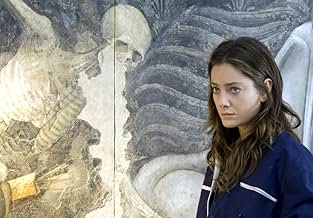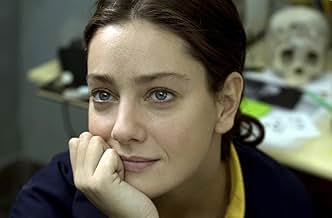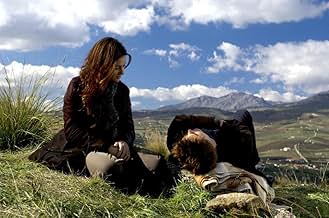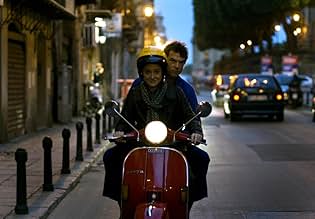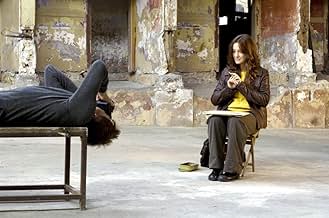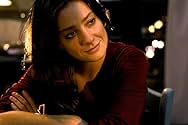IMDb RATING
6.1/10
3.3K
YOUR RATING
After the wild life-style of a famous young German photographer almost gets him killed, he goes to Palermo, Sicily to take a break. Can the beautiful city and a beautiful local woman help hi... Read allAfter the wild life-style of a famous young German photographer almost gets him killed, he goes to Palermo, Sicily to take a break. Can the beautiful city and a beautiful local woman help him calm himself down?After the wild life-style of a famous young German photographer almost gets him killed, he goes to Palermo, Sicily to take a break. Can the beautiful city and a beautiful local woman help him calm himself down?
- Director
- Writers
- Stars
- Awards
- 1 win & 2 nominations total
- Director
- Writers
- All cast & crew
- Production, box office & more at IMDbPro
Featured reviews
I saw it yesterday at a late evening screening in Los Angeles with Wenders in-attendance, and he did an intro and stayed for a Q&A afterward (which ended at 1:30am!)
I'd describe Palermo Shooting as an interesting failure, though with some good stuff in it. And not as a worst-ever film, or even as awful like some folks. Also interesting to me was how the naturalistic Wenders of "Paris, Texas" days has embraced modern CGI effects.
Dennis Hopper, in his last role, was very good in a small but important supporting part in the very last scene of the film (don't walk out early or quit watching, cause you'd miss Hopper).
It's kind of a 3 act play defining by its locations: Act 1. Dusseldorf, Act 2. Palermo, Act 3. Gangi.
Not one of Wenders good ones. But if it had some editing-out of some of the more pretentious musing stuff, and general tightening-up, and a bit of clarification here and there, it could've been pretty good. Too bad...
For a long and detailed plot summary, see the German Wikipedia page (worthwhile to do even putting up with Google Chrome's German-to-English translation.) It helped clarify a lot for me. de.wikipedia.org/wiki/Palermo_Shooting (Note: the English Wikipedia page was very minimal).
I'd describe Palermo Shooting as an interesting failure, though with some good stuff in it. And not as a worst-ever film, or even as awful like some folks. Also interesting to me was how the naturalistic Wenders of "Paris, Texas" days has embraced modern CGI effects.
Dennis Hopper, in his last role, was very good in a small but important supporting part in the very last scene of the film (don't walk out early or quit watching, cause you'd miss Hopper).
It's kind of a 3 act play defining by its locations: Act 1. Dusseldorf, Act 2. Palermo, Act 3. Gangi.
Not one of Wenders good ones. But if it had some editing-out of some of the more pretentious musing stuff, and general tightening-up, and a bit of clarification here and there, it could've been pretty good. Too bad...
For a long and detailed plot summary, see the German Wikipedia page (worthwhile to do even putting up with Google Chrome's German-to-English translation.) It helped clarify a lot for me. de.wikipedia.org/wiki/Palermo_Shooting (Note: the English Wikipedia page was very minimal).
I just saw the movie in International Film Festival of Durrës, eager as I was for another Wim Wenders experience. And I left the theater with mixed feelings. Images were so good, bur the story was so cheap. The apology of Death at the end of the movie was awful, as if written by a 15 years scholar. So was the dialogue with the shepherd. Cheap and cliché ideas about death and life. The presence in the story of G. Mezzogiorno was senseless and not justified at all. The story of a photographer that takes a shoot of Death, is not bad, whatsoever. But it surely didn't to be treated as in child books, with death coming towards you and moralizing about life and death. And above all, the pregnant Milla, pretending deeper art in VIP Photo shooting, gave a sense of pity. No worth seeing it twice.
Finn (Campino) is a German photographer. He is highly successful in his profession, but not in life. He can't quite put his finger on it, yet there's something missing and he is overwhelmed by dark thoughts. He decides to spend some time in Italy as an attempt to escape.
Palermo Shooting is a movie heavy on symbolism and with a clear philosophical orientation, a meditation about life and death. However, its good looks are its strongest asset. The setting is once again in the spotlight for Wim Wenders, first beautiful Palermo and then the gorgeous landscapes of a small Italian village.
The main character's interactions with Death are reminiscent of Bergman's The Seventh Seal, while his subjective way of experiencing reality and the use of special effects has a clear touch of German expressionism.
It's easy to tell this was a very personal project for Wim Wenders, but still not everything works. The philosophical aspect isn't that interesting or original, the dialogue leaves a lot to be desired, the soundtrack felt a bit off.
Palermo Shooting is a movie heavy on symbolism and with a clear philosophical orientation, a meditation about life and death. However, its good looks are its strongest asset. The setting is once again in the spotlight for Wim Wenders, first beautiful Palermo and then the gorgeous landscapes of a small Italian village.
The main character's interactions with Death are reminiscent of Bergman's The Seventh Seal, while his subjective way of experiencing reality and the use of special effects has a clear touch of German expressionism.
It's easy to tell this was a very personal project for Wim Wenders, but still not everything works. The philosophical aspect isn't that interesting or original, the dialogue leaves a lot to be desired, the soundtrack felt a bit off.
I can't add much to hpark5's fine comments (though I'd encourage him or her to make use of paragraph breaks) so I won't attempt a full review of Palermo Shooting. I will mention, however, that when I saw the film at the Berlin and Beyond Film Festival in San Francisco, it was received enthusiastically by an audience of over a thousand people in a packed theater.
Wim Wenders was present and answered questions after the film. The things he said were exceptionally thoughtful and responsive. Although his work may be uneven because of his willingness to take risks, I thought Palermo Shooting a major success. Wender's integration of the death theme with Palermo's ancient and decaying physical environment was especially impressive.
To me, the crucial moment of the film occurs when Finn, the photographer, asks Death what he can do for him. Death says that no one has asked him this before and that the only thing that he can do is to live well for the rest of his life.
Wim Wenders was present and answered questions after the film. The things he said were exceptionally thoughtful and responsive. Although his work may be uneven because of his willingness to take risks, I thought Palermo Shooting a major success. Wender's integration of the death theme with Palermo's ancient and decaying physical environment was especially impressive.
To me, the crucial moment of the film occurs when Finn, the photographer, asks Death what he can do for him. Death says that no one has asked him this before and that the only thing that he can do is to live well for the rest of his life.
This is easily Wim Wender's most pretentious movie to date, and that's saying a lot given that Wenders is perhaps the most pretentious director of his generation. There is so much symbolic Mumbo-Jumbo I don't know where to begin: Dungeons. Coffins. Dead people. Ghosts. Including Lou Reed as a black-and-white specter of himself. Flocks of sheep. A shape-shifting city skyline. Hooded strangers, shooting arrows and causing crashes. All of which I have seen before, and with more panache: In "Dark City", in Cronenberg's "Crash", Paul Auster's "Lulu on the Bridge", Tom Tykwer's "Winter Sleepers", even in TV's "Lost". I'm not even mentioning "The Devil's Advocate". At the height of his self-importance, Wenders has Dennis Hopper, in the part of Death himself, make a speech about the merits of analog photography. Sounds ridiculous? Go figure. But the weakest link is Wender's choice of Campino as photographer Finn Gilbert, the lead character. Campino, a German rock star in his day job, may be photogenic in an aging toy boy way, but an actor he sure is not. Anything he says sounds like a line from a script, and the script is weak enough to begin with. Wenders asks too much of him, and too little of his co-lead Giovanna Mezzogiornio, a fine actress restricted to sleepy smiles and sullen glances in this movie. Charming guest appearances by Jana Pallaske as a feisty arts student, Inga Busch as a sexy swimming instructor in Ugg boots and a bathing suit, and by the divine Milla Jovovich as her glamorous self. Nice enough soundtrack, featuring Bonnie Prince Billy, Nick Cave, and The Velvet Underground. Watch with your eyes closed.
Did you know
- TriviaThe film marks the first time that Director Wenders shot a movie in his hometown, Düsseldorf.
- GoofsIn the scene, when Finn talks with lady photographer, they discuss the age of their cameras. He tells that his Plaubel is twenty years old and she tells that her Leica is 40 years old. Actually she has Leica M7, which slightly differs from older Leica cameras. This camera marketed only in 2002.
- ConnectionsFeatured in Dennis Hopper: Uneasy Rider (2016)
- SoundtracksDream (Song for Finn)
Written by Nick Cave and Warren Ellis
Performed by Grinderman
Published by Mute Song Ltd. 2008
Courtesy of Cave/Ellis 2008
- How long is Palermo Shooting?Powered by Alexa
Details
- Release date
- Countries of origin
- Official sites
- Languages
- Also known as
- Palermo Shooting
- Filming locations
- Production companies
- See more company credits at IMDbPro
Box office
- Gross worldwide
- $580,203
- Runtime
- 2h 4m(124 min)
- Color
- Sound mix
- Aspect ratio
- 1.85 : 1
Contribute to this page
Suggest an edit or add missing content


